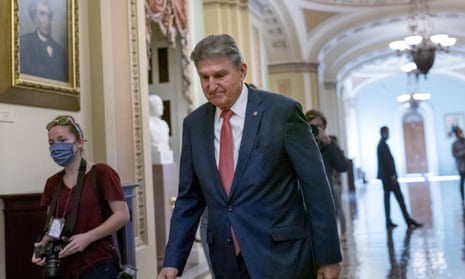Democrats will keep working on Joe Biden’s Build Back Better spending plan “until we get something done”, Senate majority leader Chuck Schumer told colleagues on Monday – a day after a stunning move by Joe Manchin of West Virginia drew accusations of betrayal from the White House and seemed to leave the president’s agenda dead in the water.
In a letter to colleagues, Schumer wrote: “We are going to vote on a revised version of the House-passed Build Back Better Act – and we will keep voting on it until we get something done.”
He also put senators on notice that they will “consider voting rights legislation as early as the first week back” next month, a timeline for another part of Biden’s agenda and an olive branch to disillusioned progressives.
Build Back Better had been delayed as the White House and Democrats in Congress sought accommodation with Manchin and fellow centrist Kyrsten Sinema of Arizona, key votes in a Senate split 50-50 and controlled by Vice-President Kamala Harris.
In his letter, Schumer spoke of “moments of deep discontent and frustration” before Manchin’s decision to use Fox News Sunday to say he was a “no” on the spending plan, which is valued at about $1.75tn and would expand health and social care and seek to combat the climate crisis, among other priorities.
Manchin cited the cost of the plan and worries including inflation, the debt and the Omicron coronavirus variant, and said: “I’ve always said this ... if I can’t go home and explain it to the people of West Virginia, I can’t vote for it.
“I cannot vote to continue with this piece of legislation. I just can’t. I’ve tried everything humanly possible. I can’t get there … This is a no on this piece of legislation. I have tried everything I know to do.”
Manchin also put out a statement. The White House responded with a fierce rebuke, accusing the senator of going back on his word – an accusation reportedly included at Biden’s insistence.
In a local radio interview on Monday, Manchin said he had reached “wit’s end” over the negotiations but refused to blame Biden either for the talks breaking down or for the angry statement.
“This is not the president, this is staff … they drove some things that are absolutely inexcusable,” he told West Virginia Radio, without further explanation. “I just got to the wit’s end of what happened.”
Manchin also claimed to have been “far apart, philosophically” with Democratic leaders for months.
“We’re in a 50-50 Senate, you all are approaching legislation [like] there is 55 or 60 Democrats,” he said.
On Monday, Schumer said Manchin’s move would not “deter us from continuing to try to find a way forward”. Listing provisions including a child tax credit, he said: “We were elected to address these many needs and we will not stop fighting until we do.”
Also on Monday, the progressive New York congresswoman Alexandria Ocasio-Cortez, attacked Manchin’s “betrayal of working class families” but said she did “not believe the situation is beyond repair”.
Speaking to MSNBC, she said the White House and Democratic leaders had the tools to move legislation.
“It’s really about time we take the kid gloves off and we start using them to govern for working families in this country,” she said.
“Our leadership needs to step up. It takes the president of the United States, who I believe needs to be more forceful on the filibuster, he also needs to lean on his executive authority and say, ‘If you’re going to get in the way, we’re going to find other ways to do it. You’re either with us or not, but this train is moving.’”
Ocasio-Cortez said it was a “farce” that Manchin held so much sway.
“This idea that we can just go on Fox News and legislate through television … and threaten to vote no is unacceptable.”
Goldman Sachs lowered its US GDP growth forecast, as did Mark Zandi, chief economist for Moody’s Analytics, following Manchin’s move.
The White House press secretary, Jen Psaki, said on Monday afternoon that she would not “relitigate” Manchin’s announcement of opposition on Sunday and her subsequent statement that was sharply critical of him.
Manchin holds one card which would change the rules of the game. Should he decide to switch parties – thereby ceasing to be the only Democrat in high office in a state that voted solidly for Donald Trump – Republicans would regain control of the Senate.
Some analysts doubt Manchin would take such a drastic step but concede that his stance makes it harder for Democrats to know the best way forward. On Monday, the website Axios cited “people close to” Manchin as saying if he did leave the party, he would probably become an independent but still caucus with the Democrats.
In his radio interview, Manchin was asked if there was still a place for him inside the Democratic party. He said he “would like to hope there was still Democrats that feel like I do”, but added that could change, CNN’s Manu Raju, tweeted.

Schumer’s pronouncement that the Senate would consider voting rights legislation next month is also significant because it indicates a stronger line on reforming the filibuster, which requires 60-vote majorities for most legislation. Manchin and Sinema are both opposed to changes.
Schumer said continued Republican opposition to voting rights efforts – guaranteed given it is being pushed in answer to Republican moves to restrict voting and make it easier to overturn elections – would prompt consideration of filibuster reform.
“Members will be given the chance to debate on the Senate floor and cast a vote so that their choice…is clear and available for everyone to see.”
Reuters contributed reporting
